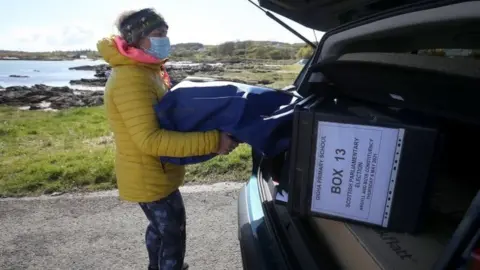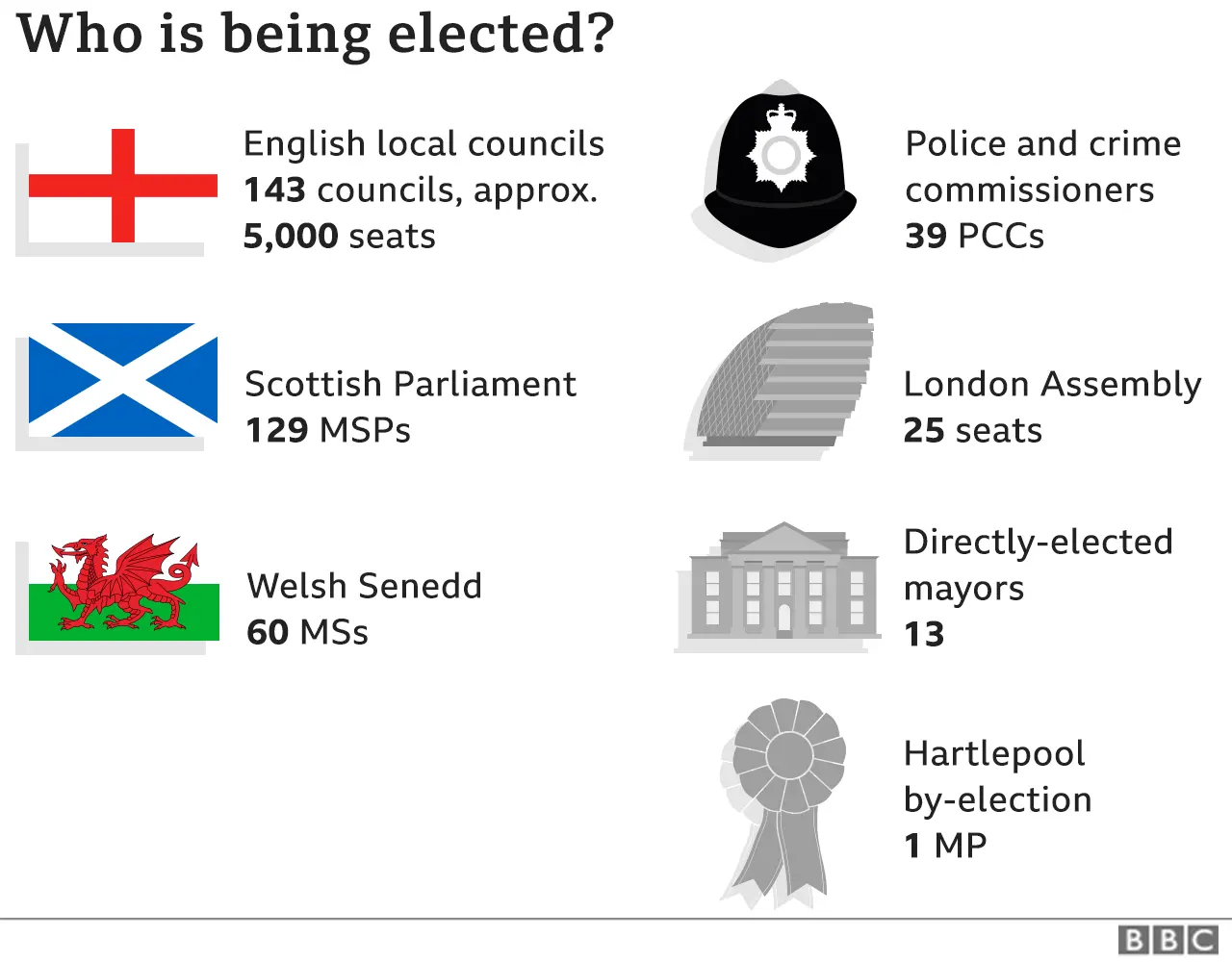Britain prepares for Super Thursday voting spree

 PA Media
PA MediaBumper ballots, Super Thursday, Election extravaganza.
Whatever you want to call the votes tomorrow, there will be millions and millions of them, in a sweeping set of elections.
There are national polls in Scotland and Wales for the Holyrood Parliament and the Senedd. Council elections across England, from the tiniest parish to huge powerful authorities, 39 ballots for police and crime commissioners, 13 directly elected mayors and the London Assembly too.
It's a strange set of elections, after a year when the country has been in and out of lockdown, putting politics and much other business as usual on hold.
Government at all levels has been grappling with a health and an economic emergency and while pollsters have been busy number crunching, there are plenty of races that are very hard to predict.
And the votes will matter in many ways, from who collects the bins in Derbyshire to the future of the whole UK.
First off, deciding who controls councils in England is an important job for voters. Councils are in charge of how the elderly are looked after, how late pubs on your high street can open, planning, the bins (of course), to name just a few.
Local government has huge influence over our lives in lots of ways. City mayors also have a growing role in the UK, whether it's what seems to have become the Labour fiefdom of London, or Tory mayor on Teesside.
The individual contests matter for our quality of life, but make a difference to political sentiment too. At this stage of an electoral cycle, where one party has been in charge nationally for more than 10 years, the Tories in this case, the oppositions should be gobbling up seats all over the place.
But having changed its leader twice, and hung on through a political rollercoaster, it just doesn't seem like that's set to happen. Indeed, the broader question for the two main parties might be about geography rather than number of places that really change hands.
Can the Tories keep up their momentum in areas the Labour Party used to rely on? Can Labour, after Jeremy Corbyn, stop the electoral rot?
For political nerds, a by-election in Hartlepool too provides a very convenient example of this big test. The current formation of the seat has never been held by the Tories. If they can grab it from Labour now, it suggests their vote in 2019 with dozens of new seats turning blue was not a fluke.
If Keir Starmer's team can't hold it, mutterings about his ability to reverse the trend will get louder. (It's important to note, though, in 2019 the Brexit Party received more than 10,000 votes in that constituency - this makes it harder this time for Labour than less recent history might suggest.)
The elections in Wales, where notably 16 and 17-year-olds will vote for the first time, seem unlikely to produce what would be the first majority in the Senedd for any party.
But the experience of the pandemic has demonstrated the powers and profile of its devolved government. Results will be watched closely there to see if that tips the balance.

The most keenly anticipated decisions though will be those made by Scottish voters. The SNP has been far and away the dominant force at Holyrood for many years. The real potential prize for Nicola Sturgeon this time round would be for the party to win a majority on its own.
Her backers believe that would give the SNP a convincing mandate to hold another independence referendum, something that Boris Johnson right now has the legal power to refuse and, indeed, says that he would block.
But some unionists fear meeting an outright majority with a brick wall would not be possible for long. Yet with internal spats and the dramatic moves of the former leader Alex Salmond, the SNP's armour-plated unity has taken a fair few knocks.
And with many Scottish races extremely close, the outcome is hard to predict. But this week could see the start of many months of fraught fights, even court cases, over the future of the Union where once again, politics in the whole UK becomes tangled up in arguments about the constitutional status quo.
It is important to remember as the results come in that these elections are complicated. They capture one moment in time, they don't make the next steps inevitable. And voters, of course, vote different ways in different contests.
This time, however, the long list of different contests will make an overall picture even harder to draw.
One insider described them as a 'spinners dream' - there will be so much going on that each party afterwards will have evidence from somewhere to try to create its own headline.
Each result will give us a jigsaw piece to try to create a pattern, but this time, not every piece will even be taken from the same box.

- Postcode search: Who is standing in your area
- Simple guide: All the elections on May 6
- Rules: How the BBC reports polling day
- Vote: Why the results might take some time

